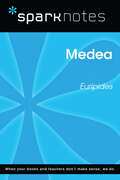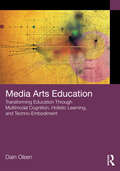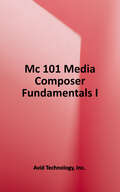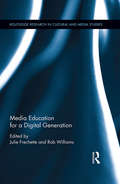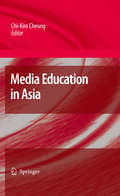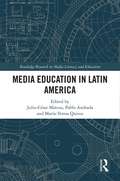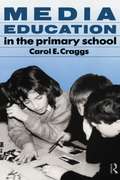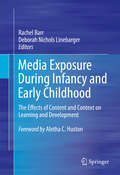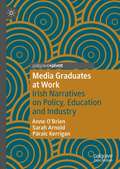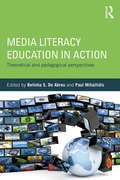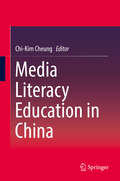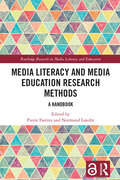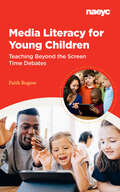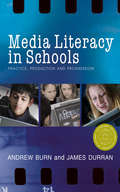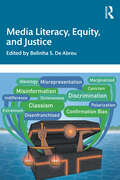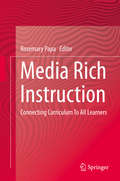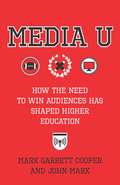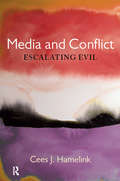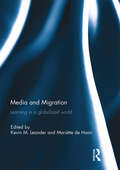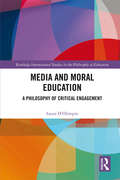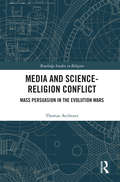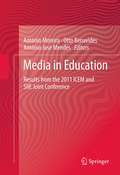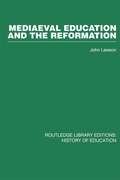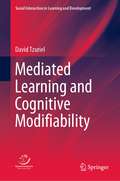- Table View
- List View
Medea (SparkNotes Literature Guide Series)
by SparkNotesMedea (SparkNotes Literature Guide) by Euripides Making the reading experience fun! Created by Harvard students for students everywhere, SparkNotes is a new breed of study guide: smarter, better, faster. Geared to what today's students need to know, SparkNotes provides: *Chapter-by-chapter analysis *Explanations of key themes, motifs, and symbols *A review quiz and essay topicsLively and accessible, these guides are perfect for late-night studying and writing papers
Media Arts Education: Transforming Education Through Multimodal Cognition, Holistic Learning, and Techno-Embodiment
by Dain OlsenThis book introduces and explains the emergent and dynamic discipline of media arts education and its potentials for educational transformation. Through an examination of its theoretical principles, holistic pedagogy, adaptive instructional practices, and diverse creative capacities, it demonstrates how media arts education can lead to a more student-centered, interdisciplinary, and effective educational model.Chapters combine academic research and practical examples to give an in-depth understanding of media arts education as it exists within schools today, as well as its potential for educational advancement. Author Dain Olsen provides an instructional framework for the discipline, including its history, research from cognitive and learning science, pedagogical principles, and examples of instructional practice. The book discusses how media arts education promotes active, multimodal and inquiry-based learning, constructivist methodology, and transdisciplinary integrations. Media arts affords students the ability to construct and simulate anything imaginable, supporting their self-directed creative inquiry. Not only can they create the myriad of artistic media, they can use it in representing and applying any core content so that it becomes aesthetically interactive, malleable and understandable. Later chapters include examples of media arts educator practices with lesson descriptions, project sequences, and instructional narratives. The book argues that media arts education can form a multimodal, interconnective, and adaptive educational system that is more empowering, engaging, flexible, and equitable for all students’ academic success.This resource is an essential companion for media arts educators at all levels. As it covers integration across a variety of contexts, it will additionally benefit educators in the fields of visual and performing arts, career technical education, media studies, computer science, and STEM and STEAM education.
Media Composer 101: Media Composer Fundamentals I
by Inc. Avid TechnologyMedia Composer 101: Media Composer Fundamentals I is an introductory book designed to get new users up and running quickly on Media Composer. <p><p>This book will teach you to edit a video project from start to finish using the same tools as Hollywood’s feature film editors. Learn to turn an interview into a compelling story, intercutting action footage with carefully selected sound bites. Use effects and sound editing to solve problems and give your video a professional polish. Plus, learn core technical skills such as how to input source video and audio files and export the finished sequence; identify Avid’s media storage locations and troubleshoot missing media. <p><p>Media Composer 101: Media Composer Fundamentals I is part of the Avid Learning Series and the official course book for MC101. When taken with the MC110 course, Media Composer Fundamentals II, this course is the first step to achieving the Avid Certified User designation.
Media Education for a Digital Generation (Routledge Research in Cultural and Media Studies)
by Rob Williams Julie FrechetteMedia education for digital citizenship is predicated upon the ability to access, analyze, evaluate and produce media content and communication in a variety of forms. While many media literacy approaches overemphasize the end-goal of accessing digital media content through the acquisition of various technology, software, apps and analytics, this book argues that the goals for comprehensive and critical digital literacy require grasping the means through which communication is created, deployed, used, and shared, regardless of which tools or platforms are used for meaning making and social interaction. Drawing upon the intersecting matrices of digital literacy and media literacy, the volume provides a framework for developing critical digital literacies by exploring the necessary skills and competencies for engaging students as citizens of the digital world.
Media Education in Asia
by Chi-Kim CheungMedia education in Asia is a relatively young, but rapidly developing part of the curriculum. Research has been conducted and papers have been written on various issues concerning media education in Asia. The dominant models of media education in the world are broadly Western and most are drawn from English-speaking countries. The question is whether a similar pattern exists in Asia, where there may be differences in culture, heritage, beliefs, values, education policy, as well as curriculum and pedagogy. Are educators in Asia following the Western model in developing and implementing media education, or are they devising their own models? With this question in mind, this book sets out to understand the prevailing perspectives regarding media education in various Asian societies. While most debates about media education are carried out in Western contexts, this book hopes to provide a platform for readers to examine this issue in an Asian context.
Media Education in Latin America (Routledge Research in Media Literacy and Education)
by Julio-César Mateus Pablo Andrada María-Teresa QuirozThis book offers a systematic study of media education in Latin America. As spending on technological infrastructure in the region increases exponentially for educational purposes, and with national curriculums beginning to implement media related skills, this book makes a timely contribution to new debates surrounding the significance of media literacy as a citizen’s right. Taking both a topical and country-based approach, authors from across Latin America present a comprehensive perspective of the region and address issues such as the political and social contexts in which media education is based, the current state of educational policies with respect to media, organizations and experiences that promote media education.
Media Education in the Primary School
by Carol CraggsMedia Education in the Primary School provides a clear, practical guide for teachers on how to approach media education. The author offers helpful advice on teaching about media institutions, news-gathering and on soaps, comics and advertising. Cross-cirucular classroom activities such as video-work, simulating advertising campaigns and photography are also included. All the activities have been thoroughly tested and are fully compatabile with current National Curriculum requirements.
Media Exposure During Infancy and Early Childhood
by Rachel Barr Deborah Nichols LinebargerThis book discusses the burgeoning world of young children's exposure to educational media and its myriad implications for research, theory, practice, and policy. Experts across academic disciplines and the media fill knowledge gaps and address concerns regarding apps, eBooks, and other screen-based technologies--which are being used by younger and younger children--and content delivery and design. Current research shows the developmental nuances of the child as learner in home, school, and mobile contexts, and the changes as parenting and pedagogy accommodate the complexities of the new interactive world. The book also covers methods for evaluating the quality of new media and prosocial digital innovations such as video support for separated families and specialized apps for at-risk toddlers. Highlights of the coverage: The role of content and context on learning and development from mobile media. Learning from TV and touchscreens during early childhood Educational preschool programming. How producers craft engaging characters to drive content delivery. The parental media mediation context of young children's media use. Supporting children to find their own agency in learning. Media Exposure During Infancy and Early Childhood is an essential resource for researchers, clinicians and related professionals, and graduate students in diverse fields including infancy and early childhood development, child and school psychology, social work, pediatrics, and educational psychology.
Media Graduates at Work: Irish Narratives on Policy, Education and Industry (Creative Working Lives)
by Anne O'Brien Sarah Arnold Páraic KerriganThis book systematically examines various factors that shape graduates’ entry into media work, which include the state and its policies, industrial and organizational practices and cultures, and media education. However, the book does not take a typical political economic or even media industries approach to this exploration. Rather, it innovatively traces how these forces are operationalized to shape media work from the perspective of the graduates, their educators and their employers. These varying perspectives are analyzed to see how graduates experience the outcomes of policy, education and industry cultures. The book examines the impact that policy, education and industry have in redefining what media work means for parts of industry that are responsible for cultivating new entrants into the creative industries.
Media Literacy Education in Action: Theoretical and Pedagogical Perspectives
by Paul Mihailidis Belinha S. De AbreuMedia Literacy Education in Action brings together the field’s leading scholars and advocates to present a snapshot of the theoretical and conceptual development of media literacy education—what has influenced it, current trends, and ideas about its future. Featuring a mix of perspectives, it explores the divergent ways in which media literacy is connected to educational communities and academic areas in both local and global contexts. The volume is structured around seven themes: • Media Literacy: Past and Present • Digital Media and Learning • Global Perspectives • Public Spaces • Civic Activism • Policy and Digital Citizenship • Future Connections Compelling, well-organized, and authoritative, this one-stop resource for understanding more about media literacy education across disciplines, cultures, and divides offers the fresh outlook that is needed at this point in time. Globally, as more and more states and countries call for media literacy education more explicitly in their curriculum guidelines, educators are being required to teach media literacy in both elementary and secondary education contexts.
Media Literacy Education in China
by Chi-Kim CheungThe Chinese government has long kept tight control on both traditional and new media to prevent potential challenges to its authority. But, for better or worse, China has now reached a stage where it is difficult to exercise political hegemony through laws and regulations and the control of the mass media. China has become a global superpower and in 2011 surpassed Japan as the world's second largest economy, second only to the USA. China's entertainment industry is also flourishing, and the market is large enough to attract foreign investors that either view China as an important market or are interested in Chinese capital. Today, more children in China watch television than in any other country in the world, and Internet usage is also increasing, making the implementation of media literacy education an important issue. This book presents the prevailing perspectives on media literacy education in China and describes how the current curriculum reform for implementing media literacy education is being developed. It will not only stimulate debate and further research, but will also influence policy decisions regarding media literacy education in China.
Media Literacy and Media Education Research Methods: A Handbook (Routledge Research in Media Literacy and Education)
by Pierre Fastrez Normand LandryThis handbook interrogates the foundations of media literacy and media education research from a methodological standpoint. It provides a detailed, illustrated overview of key methods used in the study of media literacy and media education. Further, it reveals the diversity of this research field and organizes this diversity by using three categories of investigation: media practices, educational initiatives, and prescriptive discourses. The book offers valuable reference points and tools for exploring the range of research methods used to study media literacy and media education and how these methods connect to epistemological stances, theoretical frameworks, and research questions. It serves as a guide for researchers who wish to position themselves, reflect on the methods they use or are considering using, and compare and contrast them against alternative or complementary approaches. After reading this book, readers will be better able to identify and define the objects of study in media literacy and media education research, the preferred ways of conducting investigations, the phenomena, issues, and dimensions that these are likely to bring to light, and the knowledge that they generate. This comprehensive and up-to-date overview of the field of media literacy education research methods will be of great interest to scholars and students of education studies, media studies, media literacy, cognitive science, and communication studies. Chapter 2 of this book is freely available as a downloadable Open Access PDF at http://www.taylorfrancis.com under a Creative Commons Attribution (CC-BY) 4.0 International license.
Media Literacy for Young Children: Teaching Beyond the Screen Time Debates
by Faith RogowMedia Literacy in Early Childhood Education will be a first-of-its-kind guide for pre-service and currently practicing teachers and child care professionals looking for pedagogically sound and developmentally appropriate ways to help today’s children navigate the world of media. This book is for every early childhood professional who isn’t satisfied with a “just say no” approach to children and technology, but who has concerns about digital media and may not know what to do instead. The book takes a developmental approach to media literacy, mapping out what early childhood educators need to do in the earliest years to lay the foundations for the sophisticated skills we expect of media literate adults and digital citizens. <P><P> The book is consciously upbeat and accessible. The book is suitable for students in a community college CDA program and also rigorous enough for early childhood scholars. As much as is possible in a book involving media, examples are purposefully evergreen, avoiding dependency on knowledge of specific apps or familiarity with shows that are particularly popular now. The book models media literacy education as a method by embedding media analysis opportunities and pauses for reflection throughout, not just in sections specifically dedicated to those skills. This book is premised on the belief that every early childhood professional has the capacity to navigate the profound challenges of preparing young children to thrive in an unpredictable digital future. Equipped with wonder and imagination, users will be able to use the practice and pedagogy of media literacy education as a field guide.
Media Literacy in Schools: Practice, Production and Progression
by Andrew Burn James DurranIncludes CD-Rom 'Intriguing and timely...I whole heartedly recommend this text to teacher educators and their trainees, certainly across English and the Arts, but arguably to all engaged in considering critical pedagogy across the curriculum' - ESCalate `This is a very timely book, firmly rooted in authentic, albeit visionary, classroom practice, that has much to offer to teachers of all subjects, but should be particularly welcomed by English and media colleagues' - English Drama Media `Heaving with ideas...outstanding lesson ideas and inspiring work from students' - The Secondary English Magazine `I really enjoyed working my way through this book...The book is accompanied by a DVD organised into chapters which correspond to those in the book, and it was great to see the ideas and schemes referred to in the text come alive. The schemes have been included which makes it even easier to adapt the work to fit the technology and resources available in your own school..All teachers of media would benefit from browsing this book' - Learning & Teaching Update This book is for secondary English, Media, and ICT teachers who want to develop practical media work and media literacy across the curriculum. It is ideal for secondary English and media teachers and curriculum leaders in secondary schools, as well as ICT teachers and co-ordinators, PCGE English/Media students, and researchers working on media, English and ICT projects. A range of case studies are presented which show how digital media work, from video editing to computer game authoring, can be developed in schools, drawing on children's own cultural knowledge. It also shows the benefits of such projects in terms of learning outcomes and increased self-esteem for a range of learners. The book comes with a CD-Rom of children's work from the various case study projects, exhibiting the high standard of moving image work, animations and computer games that can be produced with the help of this text. With an integrated approach drawing together practice, theory and research, the book will help teachers to plan for and develop their own media projects in school. It offers advice on integrating media work across the curriculum (in English and media classes as well as in ICT and citizenship), and presents a model of progression which shows how learning can develop from the first years of secondary school through to GCSE level. In line with current government initiatives to open up curriculum boundaries, the book shows how to plan for longer periods of time for these projects.
Media Literacy, Equity, and Justice
by Belinha S. De AbreuOffering a new and thought-provoking look at media literacy education, this book brings together a range of perspectives that address the past, present, and future of media literacy, equity and justice. Straddling media studies, literacy education, and social justice education, this book comes at a time when the media’s role as well as our media intake and perceptions are being disrupted. As a result, questions of censorship, free speech, accountability abound, and nuance is often lost. This book is an antidote to the challenges facing media literacy education: chapters offer a careful examination of important and hot topics, including AI, authenticity, representation, climate change, activism and more. Addressing the continually evolving role of media and its impact on our society and shared knowledge base, the volume is organized around five themes: Misinformation and Disinformation; Media Representation; Civic Media, Politics and Policy; Eco Media Literacy; Education and Equity, Ethical Quandaries and Ideologies; and Emerging Technologies. Ideal for courses on media literacy and new literacies, this book furthers the conversation on the ways literacy and social justice are connected to educational communities in local and global contexts.
Media Rich Instruction
by Rosemary PapaE-learning has brought an enormous change to instruction, in terms of both rules and tools. Contemporary education requires diverse and creative uses of media technology to keep students engaged and to keep up with rapid developments in the ways they learn and teachers teach. Media Rich Instruction addresses these requirements with up-to-date learning theory and practices that incorporate innovative platforms for information delivery into traditional areas such as learning skills and learner characteristics. Experts in media rich classroom experiences and online instruction delve into the latest findings on student cognitive processes and motivation to learn while offering multimedia classroom strategies geared to specific curriculum areas. Advances such as personal learning environments, gamification, and the Massive Open Online Course are analyzed in the context of their potential for collaborative and transformative learning. And each chapter features key questions and application activities to make coverage especially practical across grade levels and learner populations. Among the topics included: Building successful learning experiences online. Language and literacy, reading and writing. Mathematics teaching and learning with and through education technology. Learning science through experiment and practice. Social studies teaching for learner engagement. The arts and Technology. Connecting school to community. At a time when many are pondering the future of academic standards and student capacity to learn, Media Rich Instruction is a unique source of concrete knowledge and useful ideas for current and future researchers and practitioners in media rich instructional strategies and practices.
Media U: How the Need to Win Audiences Has Shaped Higher Education
by John Marx Mark Garrett CooperAre homecoming games and freshman composition, Twitter feeds and scholarly monographs really mortal enemies? Media U presents a provocative rethinking of the development of American higher education centered on the insight that universities are media institutions. Tracing over a century of media history and the academy, Mark Garrett Cooper and John Marx argue that the fundamental goal of the American research university has been to cultivate audiences and convince them of its value.Media U shows how universities have appropriated new media technologies to convey their message about higher education, the aims of research, and campus life. The need to create an audience stamps each of the university’s steadily proliferating disciplines, shapes its structure, and determines its division of labor. Cooper and Marx examine how the research university has sought to inform publics and convince them of its value to American society, from the rise of football and Great Books programs in the early twentieth century through a midcentury communications complex linking big science, New Criticism, and design, from the co-option of 1960s student activist media through the early-twenty-first-century reception of MOOCs and the latest promises of technological disruption. The book considers the ways in which universities have used media platforms to reconcile national commitments to equal opportunity with corporate capitalism as well as the vexed relationship of democracy and hierarchy. By exploring how media engagement brought the American university into being and continues to shape academic labor, Media U presents essential questions and resources for reimagining the university and confronting its future.
Media and Conflict: Escalating Evil (Media and Power)
by Cees Jan HamelinkThe world faces explosive conflicts about the distribution and scarcity of resources, about ethnicity and religion, and about the risks of urban life. These conflicts can easily spiral out of control toward mass slaughter-an evil of huge proportions that is often escalated by the media. What should be done to prevent this lethal trend? We need to understand how the 'spiral of escalation' works. How do media create anxiety, provide space for agitation, and disconnect people? Three approaches to the prevention of mass mediated aggression are proposed in this book: an early warning system for incitement to mass destruction, the invitation to disarming conversations in urban space, and the teaching of 'compassionate communication' to children and others. Alertness to the recurrence of collective violence is urgently needed not only in unstable and poor societies, but also in established democracies. Ordinary people can be incited to the mass slaughter of other ordinary people anywhere. Understanding the media's role in this and acting to prevent it are key goals of this book.
Media and Migration: Learning in a globalized world
by Kevin M. Leander Mariëtte De HaanMedia and Migration: Learning in a globalized world brings together studies located at the intersection of migration, media and learning, and considers how the learning practices of youth in migration are shaped by new media. The change in the mobilities of people, media, and material goods which allow new connections between 'global' and 'local' life has had a significant impact on contemporary migration, as well as social life more generally. The contributors to this book show how learning trajectories of individual learners become defined by broadly distributed networks and knowledge systems. Learning in stable, closed, and culturally uniform settings is becoming the exception rather than the norm. While immigrant youth are often associated with juggling multiple lives or worlds, such juggling is increasingly becoming typical for all youth living with new media. The book therefore addresses youth learning more generally in relation to media, globalization, and diversity, as well as the digital learning practices of immigrants and non-immigrants. This book was originally published as a special issue of Learning, Media and Technology.
Media and Moral Education: A Philosophy of Critical Engagement (Routledge International Studies in the Philosophy of Education)
by Laura D'OlimpioMedia and Moral Education demonstrates that the study of philosophy can be used to enhance critical thinking skills, which are sorely needed in today’s technological age. It addresses the current oversight of the educational environment not keeping pace with rapid advances in technology, despite the fact that educating students to engage critically and compassionately with others via online media is of the utmost importance. <P><P>D’Olimpio claims that philosophical thinking skills support the adoption of an attitude she calls critical perspectivism, which she applies in the book to international multimedia examples. The author also suggests that the Community of Inquiry – a pedagogy practised by advocates of Philosophy for Children – creates a space in which participants can practise being critically perspectival, and can be conducted with all age levels in a classroom or public setting, making it beneficial in shaping democratic and discerning citizens. <P><P>This book will be of interest to academics, researchers and postgraduate students in the areas of philosophy of education, philosophy, education, critical theory and communication, film and media studies.
Media and Science-Religion Conflict: Mass Persuasion in the Evolution Wars (Routledge Studies in Religion)
by Thomas AechtnerThis book examines why the religion-science skirmishes known as the Evolution Wars have persisted into the 21st century. It does so by considering the influences of mass media in relation to decision-making research and the Elaboration Likelihood Model, one of the most authoritative persuasion theories. The book’s analysis concentrates on the expression of cues, or cognitive mental shortcuts, in Darwin-sceptic and counter-creationist broadcasts. A multiyear collection of media generated by the most prominent Darwin-sceptic organizations is surveyed, along with rival publications from supporters of evolutionary theory described as the pro-evolutionists. The analysed materials include works produced by Young Earth Creationist and Intelligent Design media makers, New Atheist pacesetters, as well as both agnostic and religious supporters of evolution. These cues are shown to function as subtle but effective means of shaping public opinion, including appeals to expertise, claims that ideas are being censored, and the tactical use of statistics and technical jargon. Contending that persuasive mass media is a decisive component of science-religion controversies, this book will be of keen interest to scholars of Religion, Science and Religion interactions, as well as researchers of Media and Communication Studies more generally.
Media in Education
by Antonio Jose Mendes António Moreira Otto BenavidesWith the aim of discussing "old" and "new" teaching technologies, based on research and on the strategies and praxis of the use of technologies and methodologies in the different teaching levels, and also embracing the contribution and active participation of researchers, teachers, creators, managers and other specialists, the work will provide inputs on the following topics: Students' perspectives on media in the classroom, Students and media (as content and as tools for learning), Educational Media Design, Institutional Impact of the integration of Educational Media, Old v. New Media: what really matters, Research and Evaluation, Personal and/or social learning environments/networks, Media and inclusion, Media and informal learning, Immersive learning environments, Virtual mobility in Education, Mobile learning, Media and literacies
Media-Related Out-of-School Contact with English in Germany and Switzerland: Frequency, Forms and the Effect on Language Learning
by Maleika KrügerThis open access book aimes to close a critical research gap in understanding how frequently German-speaking adolescents come into contact with the English language through various media channels, such as television, books, or the internet, and how this contact influences learners’ English competences. In addition, this research project explores the effect of family background and gender on this contact. The analysis shows frequent contact with English-language media content by young learners in Germany and Switzerland. More frequent contact was associated with higher language competences. Differences could be found in the preferences of media content and type of media channels due to socio-economic family background and gender.
Mediaeval Education and the Reformation
by John LawsonOriginally published in 1967, this volume provides an account of the early development of English education. The schools and universities of the mediaeval period arose to meet the social needs of that time. The book charts developments up to the sixteenth century when the Reformation brought profound social and religious changes which affected education: not only the organisation of schools and universities but also the curriculum. This was the turning point when the foundations of an educational system, in the modern sense of the term, were laid.
Mediated Learning and Cognitive Modifiability (Social Interaction in Learning and Development)
by David TzurielThis book portrays an extensive and intensive discussion of theories and research that refer to Vygotsky’s and Feuerstein’s theories of mediated learning and their effects on learning potential and cognitive modifiability. Most topics are discussed in relation to a broad spectrum of developmental and cognitive research that are under the conceptual umbrella of mediated learning and cognitive modifiability. Some topics such as neural plasticity, executive functions, mental rotation, and cognitive education are related to mediated learning, though indirectly, and therefore are included in this book. In many ways the book presents an extension of Vygotsky and Feuerstein’s theories and empirical validation in a variety of family, social and cultural contexts. The book includes a thorough analysis and summary of 50 years of research and methodology of the intimate relation between mediated learning interactions and cognitive modifiability and of dynamic assessment underlying measurement of cognitive modifiability. Special emphasis is given to Tzuriel’s dynamic assessment instruments developed during more than four decades. Tzuriel’s novel instruments are interwoven in the extensive research on parent-child interactions, siblings’ , teachers' and peers' mediation and in validation of dynamic assessment approach and cognitive education programs aimed at development of thinking skills and academic achievements.
